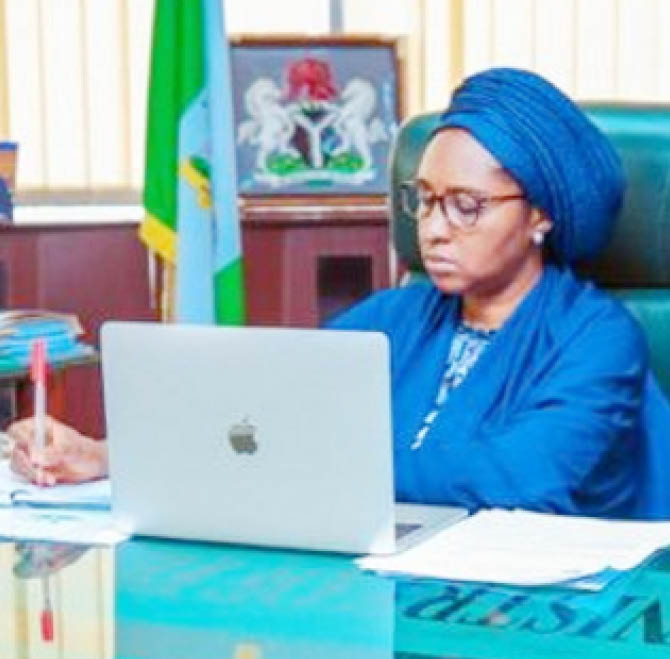FG insists on N23tr securitisation of ways and means
The Minister of Finance, Budget and National Planning, Mrs Zainab Ahmed, has said the federal government will go ahead with the securitisation of N23.7 trillion ways and means advances issued by the Central Bank of Nigeria (CBN). The minister disclosed this during the public presentation of the 2023 federal government’s budget at the ministry’s headquarters […]

Minister of Finance, Budget and National Planning, Zainab Ahmed
The Minister of Finance, Budget and National Planning, Mrs Zainab Ahmed, has said the federal government will go ahead with the securitisation of N23.7 trillion ways and means advances issued by the Central Bank of Nigeria (CBN).
The minister disclosed this during the public presentation of the 2023 federal government’s budget at the ministry’s headquarters in Abuja yesterday.
Recall that in December last year, President Muhammadu Buhari sent to the Senate a request for approval of the restructuring of N23.7tr Ways and Means advances given to the government by the CBN.
Speaking during the public presentation, Mrs Ahmed said: “The President has approved the securitisation of the ways and means balances with the amount being N23.7 trillion and a 40 years moratorium tenure on principal repayment, three years and pricing interest rate 9 per cent.”
She said, “The CBN ways and means has built up over eight years from 2014-2022 to the current amount and we are hopeful that the National Assembly will pass it as requested by Mr President.
54m people must elect next president – Coalition
Why Kebbi South will not vote APC – PDP senatorial candidate
“The National Assembly has set up a special committee for this purpose and we are ready to interface with them to provide the necessary explanations needed to pass the budget.
“If passed, it will bring significant fiscal relief to the federal government considering a moratorium of 40 years and interest rate of nine per cent. President Buhari has urged the National Assembly to pass it and we are hopeful they will,” Ahmed stated.
Speaking further, the minister said Nigeria can no longer be described as a mono-economy as the non-oil sector is now the mainstay of the economy.
“Nigeria cannot be referred to as a mono-economy any longer as the non-oil sector is now becoming the major sustenance for the economy, contributing about 70 per cent of revenues.
“In the past, oil revenues were 70 per cent while non-oil revenues were 30% but that story has changed now the situation is now vice-versa.
“The latest Gross Domestic Product figures from the National Bureau of Statistics show that agriculture contributed over 20 per cent of GDP while sectors like ICT, financial services, trade, and transport also contributed significantly to the growth,” she further said.
Speaking on fuel subsidy, Mrs Ahmed disclosed that in the 2023 fiscal period, the government only made a provision of N3.36tr for fuel subsidy payment to cover the first six months of 2023 in line with the 18-month extension announced in early 2022.
“In this regard, only N3.36tr has been provided for the PMS subsidy. There will be tighter enforcement of the performance management framework for government-owned enterprises that will significantly increase operating surplus/dividend remittances in 2023.”
On the federal government’s revenue, Mrs Ahmed said as of November 2022, the sum of N6.50trn was generated. This, she said, is about 87% of the prorated target of N7.48tr.
She put the share of the federal government’s oil revenues at N586.71bn representing 35.7% performance, while non-oil tax revenues totalled N2.09tr – a performance of 123.3%.
She stated that the Company’s Income Tax and Value Added Tax collections were N1.08tr and N295.2 billion, representing 158.6% and 124.3% of their respective targets.
Ahmed added that Customs collections, comprising import duties, excise, fees and special levies, exceeded the target by N15.42bn.
On actual spending from the 2022 budget, she said as of November 30, it was N12.87tr.
Of this amount, N5.24tr was for debt service; N3.94tr for personnel costs including pensions; statutory transfers, overhead and service-wide votes.
Meanwhile, the Director General of the Budget Office of the Federation, Mr Ben Akabueze, said the federal government is constrained in reducing personnel costs when preparing budgets.
“Government cannot do much to bring down personnel costs. I hear people shouting that N5.2 trillion personnel cost is too much, but if you consider the fact that the amount will be divided among 1.5 million employees of the federal government including security agencies, you will see the amount just averages N200,000.
“As such, I don’t think the workforce of the federal government is over bloated compared to other countries of the world,” Akabueze stated.
